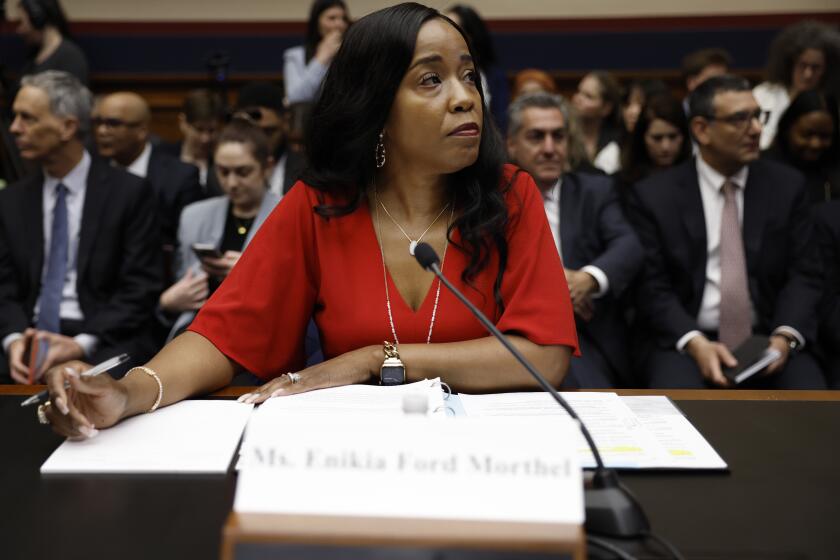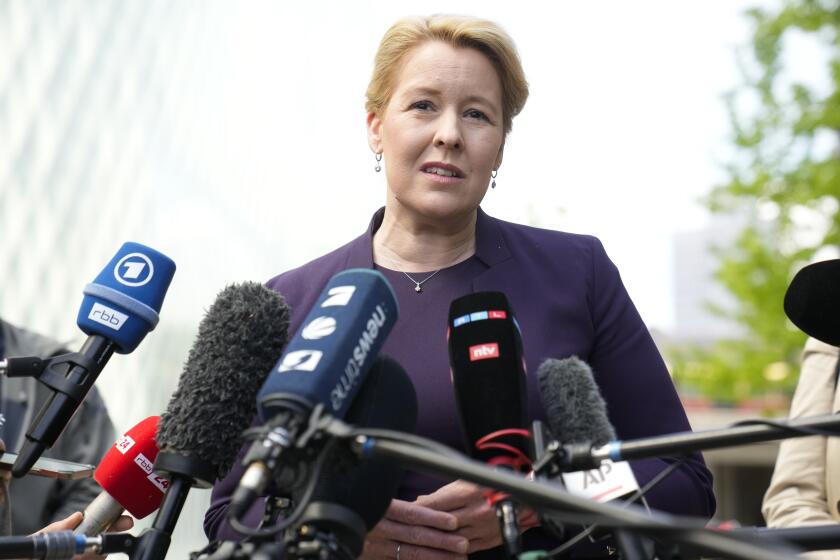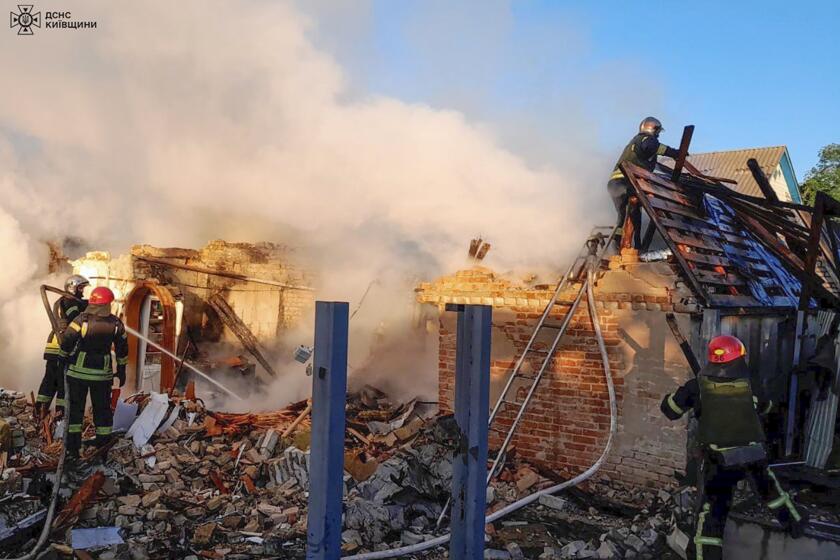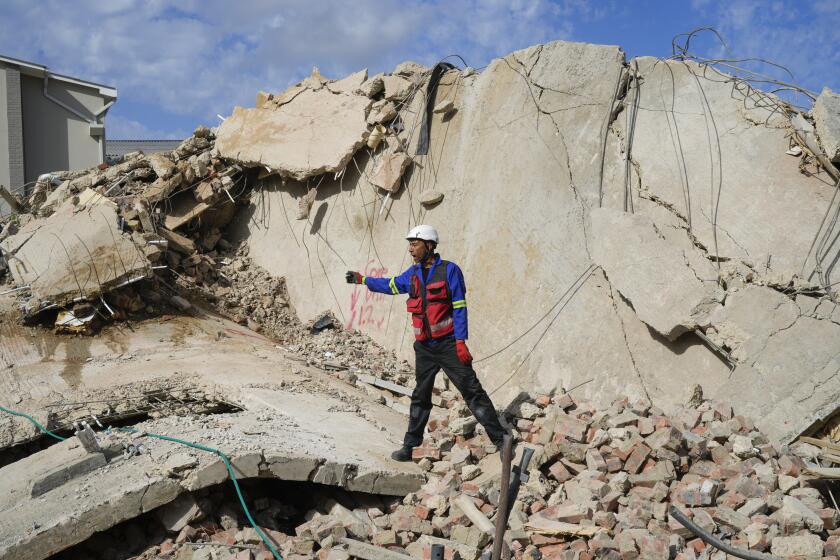Gay marriage reaction? All over the map
In the Netherlands and Canada, it was old news. In India and Iraq, it wasn’t news at all.
The same-sex weddings that have begun in California have provoked neither euphoria nor great outrage overseas, where gays and lesbians face a patchwork of laws governing their unions and live with attitudes ranging from acceptance to hostility that can lead to the death penalty.
It all depends on where they live.
Many parts of Europe have reacted with a collective shrug to the California Supreme Court ruling that found the ban on same-sex marriage to be discriminatory. Same-sex marriage has been legal in the Netherlands since 2001, in Belgium since 2003 and in Spain since 2005. The move by the second U.S. state to join them brought only cursory news coverage.
Elsewhere, Canada has officially recognized same-sex marriage since 2005. South Africa stands out as the exception on a continent where homosexuality is largely taboo. It passed a law in 2006 to recognize homosexual marriages after a Constitutional Court ruling said anything less would treat gays and lesbians as inferior.
Those laws came after more than a decade in which several countries took the lesser legal step of recognizing homosexual civil unions.
Denmark has recognized same-sex “partnerships” since 1989, which ensured that gay and lesbian couples received most of the same social benefits, such as pensions, as married heterosexuals. That move was subsequently followed by Germany, France and Britain, though none of those countries has gone as far as the California court by elevating them to the same legal status as heterosexual marriage.
Gays and lesbians considered the same-sex marriage law passed by Spain, where homosexuality was illegal under the Franco dictatorship, as a particularly significant milestone.
Gay activist Beatriz Gimeno saw the California decision as a sign that “the snowball of equality is continuing to roll, even in a country like the United States that has not yet overcome its neoconservative cycle.”
But the conservative newspaper ABC countered that while “homosexuals have every right in the world to choose a partner and demand that they not be discriminated against,” they cannot insist their unions are identical to heterosexual couples “because nature says so: Their union cannot produce children.”
There is similar opposition to same-sex marriage in other European countries, especially ones with strong Roman Catholic traditions such as Poland, which has rejected attempts to allow gay and lesbian couples to “register” their unions, and Ireland and Italy.
In many other countries, the issue is smothered by taboo.
Sexuality in general is seldom discussed in India, where gay sex remains punishable under a law imposed during the British Raj. In Russia, the 1995 Family Code specifies that marriage is a state between a man and a woman.
And though homosexuality is a frequent theme of some Japanese manga comics and some TV characters revel in camp, few of the country’s real-life gays and lesbians like to draw much attention.
In 2007, Kanako Otsuji, the country’s first openly lesbian politician, “married” her lover, Maki Kimura, in a public ceremony in Nagoya. But Japan does not recognize either same-sex marriage or civil unions.
Same-sex marriage is a remote prospect in the Arab world and Iran. Iranian President Mahmoud Ahmadinijad last year insisted that there were no homosexuals in his country. Human rights activists have accused Iran of executing homosexuals for engaging in consensual sex, and homosexuality can also be punished by death in Saudi Arabia, Mauritania and Yemen.
In Iraq, Grand Ayatollah Ali Sistani, the major religious leader for the country’s Shiites, has issued a fatwa against homosexuality. The fatwa has since disappeared from his website but has never been rescinded.
Despite violence directed at gays and lesbians, a spokesman for Iraqi Prime Minister Nouri Maliki told The Times last year that “nobody’s paying attention to the issue. It’s not the custom of the people of Iraq.”
Few gays and lesbians live openly in Africa because harassment and discrimination are prevalent outside South Africa. Some religious leaders have decried homosexuality as “un-African,” and Gambian President Yahya Jammeh declared it to be incompatible with his country’s Islamic tenets. He threatened to behead any gays or lesbians who did not leave the country.
Same-sex unions are also widely banned in heavily Roman Catholic Latin America. But there are a few places where gay and lesbian couples can forge civil unions: Uruguay, Colombia and Argentina’s capital, Buenos Aires, which hosted the Gay World Cup of soccer last year.
And hundreds of gays and lesbians have held ceremonies with little fuss in Mexico City since that federal district recognized same-sex civil unions in March 2007.
The California ruling did draw sharp criticism from one person: confessed Sept. 11 mastermind Khalid Shaikh Mohammed, who used his June 5 arraignment to show that news of California’s same-sex marriages had reached the Guantanamo Bay detention facility.
“Evil laws are not the laws of God,” Mohammed told the U.S. military and civilian officials at his trial, citing “laws allowing same-sex marriages” as an example.
“I consider all American laws under the Constitution to be evil,” he said.
--
Contributing to this report were Times staff writers Richard Boudreaux in Jerusalem; Henry Chu in New Delhi; Andres D’Alessandro in Buenos Aires; Borzou Daragahi in Beirut; Marla Dickerson in Mexico City; Maggie Farley in New York; Kim Murphy in London; Ned Parker in Baghdad; Edmund Sanders in Nairobi, Kenya; Megan Stack in Moscow; Tracy Wilkinson in Rome; and Carol Williams in Miami.
More to Read
Start your day right
Sign up for Essential California for news, features and recommendations from the L.A. Times and beyond in your inbox six days a week.
You may occasionally receive promotional content from the Los Angeles Times.






